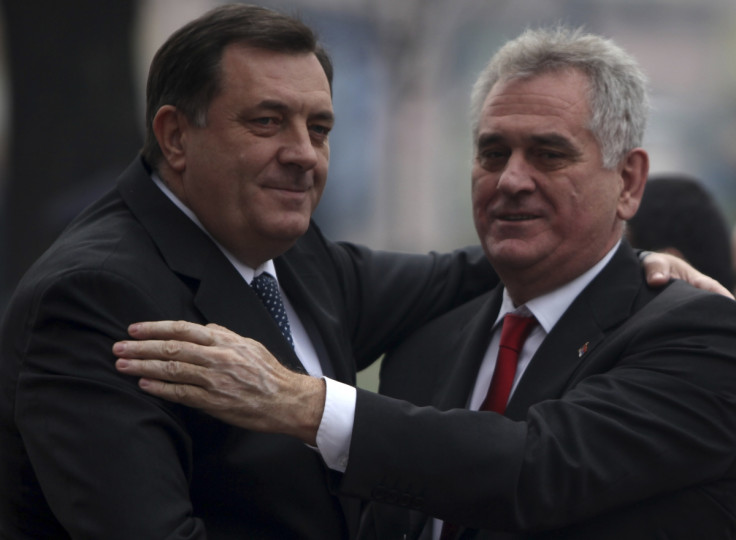Paddy Ashdown: Bosnia Failure is Fault of EU

The international community's former high representative in Bosnia, Lord Ashdown, has issued a stark warning to the West on the future of Bosnia claiming that its neglect turned the country into a failed state.
In an interview with IBTimes UK, Paddy Ashdown, high representative from 2002-06, vigorously defended his efforts to strengthen the central state institutions in the wartorn country, encourage refugees to return home, and bring many Bosnian Serb war criminals to justice.
But the former Lib-Dem leader also argued that Bosnia was far from reaching a stable position and for 12 years all the advances previously made had gone into reverse.
"Bosnia and Herzegovina made more progress towards integration and the creation of a functional state than any other post-conflict state anywhere in the world," Ashdown said.
"Then tragically, disastrously, stupidly, the European Union took their foot off the brake and decided that we didn't have to use any influence and leverage any longer.
"I blame in large measure Bosnian politicians for that but I also blame Brussels because if there's anywhere that did not continue to drive forward the political structure that would anchor those gains, it occurred in Bosnia but it also occurred in Brussels."
"Dayton is our floor but it cannot be our ceiling"
During the conflict three million people were driven out of their homes. A million returned.
"Bosnia invented, created the right of refugees normally driven out by war to return home," Ashdown said.
Bosnia became the major battleground in a violent and bitter multi-sided war. According to official estimates, 100,000 people were killed during a conflict in which Bosnian Serb forces carried out ethnic cleansing against Bosnian Muslims across a large part of the country in an effort to create an homogenous Serb territory joining Serbia to Serbian Bosnia and Croatia.
The peace agreement which ended the 1992-95 war, signed in Dayton, Ohio, split the country into two autonomous entities: the Bosnian Federation and Republika Srpska, or Serb Republic.
"I don't think there's any single person that I know of who doesn't believe that Dayton - an untidy peace that it was - was a necessary peace to end the war. In 1995 I know of nobody who wouldn't have preferred an untidy peace to the continuous slaughter of the Bosnian war."
But Dayton also created the seeds of a future crisis. It was based on a decentralised and dysfunctional system of power-sharing that has effectively paralysed central government, scared investors, blocked economic policy and denied prosperity.
Over the last few months, protests have broken out in Bosnia's biggest cities over unemployment, corruption and political stagnation. Unrest began when a protest by workers in Dita and other factories in the industrial city of Tuzla spread to other cities – Sarajevo, Zenica and Mostar – and rioters set fire to government buildings.
Ashdown said the agreement proved unfit for purpose and could not help Bosnia achieve economic prosperity and integration with the EU.
"The problem about Dayton is that it is a barrier to build a sustainable state once the peace has been stabilised," he said. "And what you needed was the leverage of the international community to ensure that Bosnia moved beyond Dayton towards a functional state. When I went to Bosnia I said Dayton is our floor but it cannot be our ceiling."
Secession in Republika Srpska?

All the advances in Bosnia to steer the country towards a modern and functional state – a single army, a single intelligence service, a single judiciary, a single custom service – have been allowed to unravel, according to Ashdown.
In particular, in Republika Srpska, Bosnian Serb politicians led by president Milorad Dodik have undermined efforts to consolidate Bosnia as a unitary state and even called for the Republika Srpska to separate from Bosnia and join Serbia. It sounds like a familiar pattern in Europe.
"In Republika Srpska, arguably the two greatest achievements of Bosnians working with the international community - the creation of a single judiciary and the creation of a VAT system of taxation - have begun to unravel because Milorad Dodik is moving towards secession, and he's unconstrained by the powers of Europe or the international community.
"I regret that greatly."
Ashdown recently visited the Bosnian capital of Sarajevo and cautioned that Russia would launch a power-grab in the country as Putin continues his aggressive expansion.
Dodik, who has gone on record as saying that Bosnia was "one unhappy country that needs to be split into three parts", visited Moscow in March and was told by Putin that he should borrow money from Russia instead of the IMF.
Putin's attempts to put pressure on the Serbian government in Belgrade to install pro-Russian ministers is a direct challenge.
Whether the Russian threat in Bosnia is real or not, Ashdown's words resonate in Brussels. Only time will prove him right.
© Copyright IBTimes 2025. All rights reserved.






















